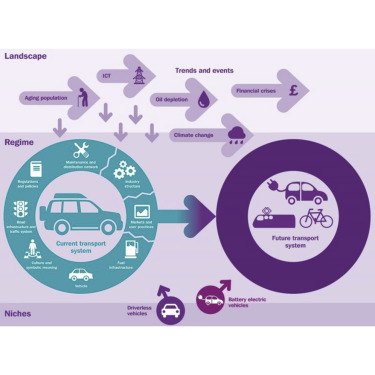Joule ( IF 39.8 ) Pub Date : 2017-10-17 , DOI: 10.1016/j.joule.2017.09.018 Frank W. Geels , Benjamin K. Sovacool , Tim Schwanen , Steve Sorrell

|
Effective mitigation of climate change will require far-reaching transformations of electricity, heat, agricultural, transport, and other systems. The energy studies and modeling research that so often dominate academic and policy debates provide valuable insights into these transitions, but remain constrained by their focus on rational decision-making and their neglect of non-linear dynamics and broader social processes. This review describes insights from a complementary socio-technical approach that addresses the interdependent social, political, cultural, and technical processes of transitions. Focusing on the “multi-level perspective”, the paper conceptualizes transitions as arising from the alignment of processes within and between three analytical levels: niche innovations, socio-technical regimes, and the socio-technical landscape. This analytical framework is illustrated with a case study of the German electricity transition and is used to appraise low-carbon transitions in several other sectors. We end by articulating four lessons for managing low-carbon transitions.
中文翻译:

低碳转变的社会技术动力学
有效缓解气候变化将需要电力,热力,农业,运输和其他系统的深刻变革。经常在学术和政策辩论中占主导地位的能源研究和模型研究为这些转变提供了宝贵的见识,但由于它们对理性决策的重视以及对非线性动力和更广泛社会过程的忽视而受到限制。这篇评论描述了互补的社会技术方法的见解,该方法解决了相互依存的社会,政治,文化和技术过程之间的过渡。本文着眼于“多层次视角”,将过渡过程概念化,是由三个分析水平内和之间的过程协调所产生的:利基创新,社会技术体制和社会技术格局。通过对德国电力转型的案例研究说明了该分析框架,并用于评估其他几个行业的低碳转型。最后,我们阐述了管理低碳转型的四个教训。



























 京公网安备 11010802027423号
京公网安备 11010802027423号